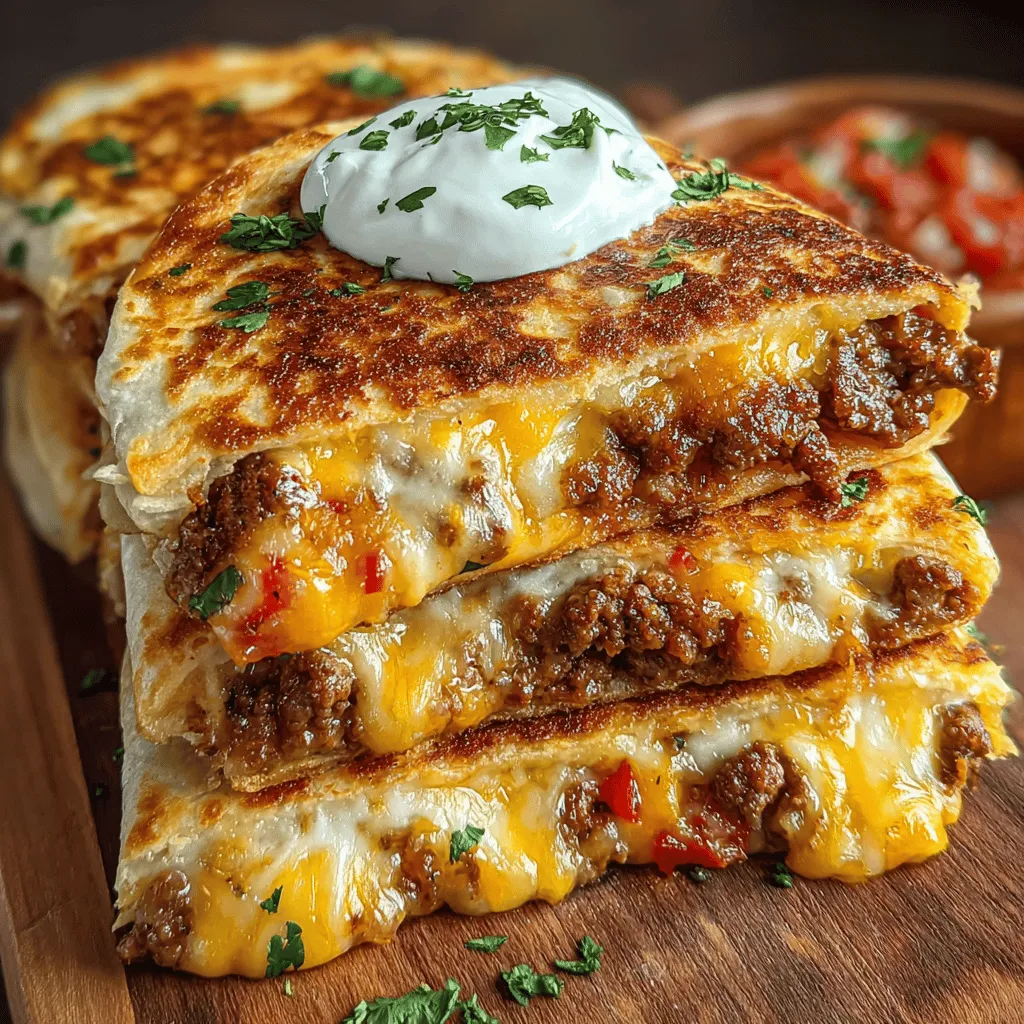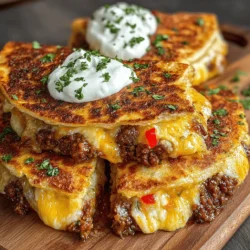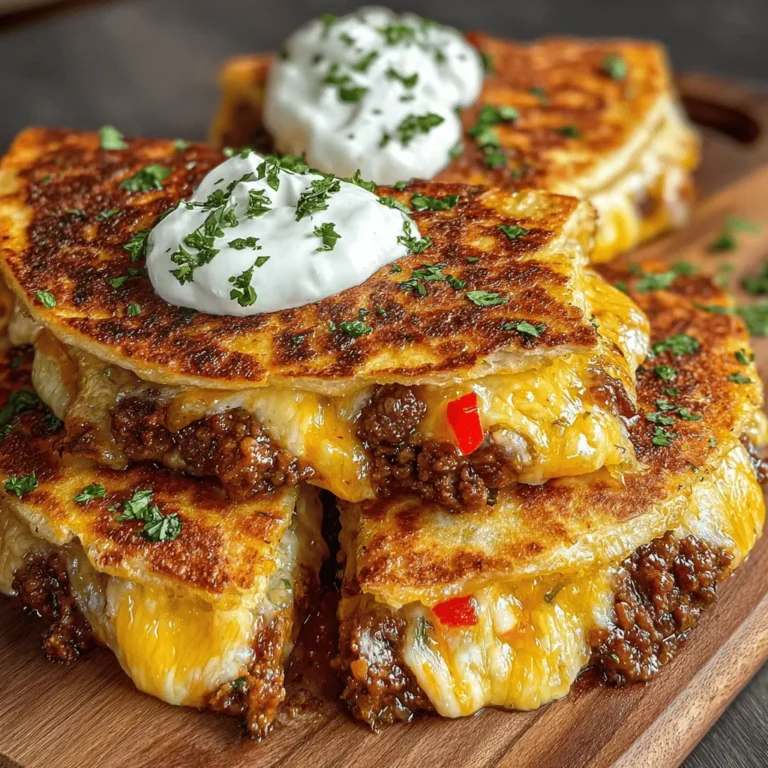Introduction
Savory Beef and Cheese Quesadillas Night is more than just a meal; it’s an experience that brings family and friends together over delicious, cheesy goodness. This recipe encapsulates the essence of comfort food, combining seasoned ground beef, sautéed vegetables, and melted cheese, all tucked between crispy flour tortillas. Whether you’re hosting a casual dinner or throwing a lively gathering, these quesadillas are sure to be a hit. As you embark on this culinary adventure, you’ll discover not only how to create this mouthwatering dish but also gain insights into ingredient choices and presentation tips that will elevate your dining experience.
The Allure of Quesadillas
Quesadillas have become a beloved staple in many households, and it’s easy to see why. Their simplicity, combined with the ability to customize fillings to suit personal tastes, makes them a crowd favorite. Originating from Mexico, quesadillas are traditionally made with tortillas filled with cheese, but over time, they have evolved to include a wide variety of ingredients. This versatility has allowed them to transcend cultural boundaries, appearing in various forms across different cuisines.
The charm of quesadillas lies not only in their flavor but also in their adaptability. From classic cheese-only versions to hearty meat and vegetable combinations, the possibilities are endless. This makes them ideal for any occasion, whether you’re looking for a quick weeknight dinner, a snack for game day, or a unique dish to impress guests at a dinner party.
Ingredients Breakdown
To create the perfect Savory Beef and Cheese Quesadillas, it’s essential to choose the right ingredients. Each component plays a crucial role in achieving the desired flavor and texture. Here’s a detailed look at the key ingredients you’ll need for this recipe:
Ground Beef: Choosing the Right Cut
The foundation of any great quesadilla begins with the protein. Ground beef is a popular choice, offering a rich and hearty flavor that pairs beautifully with cheese. When selecting ground beef, opt for a lean cut, such as 80/20 or 90/10, which balances flavor and reduces excess grease. This ensures that your quesadillas are not only tasty but also have a pleasant texture that doesn’t become overly greasy during cooking.
Vegetables: The Role of Onion, Garlic, and Bell Peppers
Adding vegetables to your quesadilla filling not only enhances the flavor but also boosts the nutritional value. The classic combination of diced onions, minced garlic, and bell peppers adds a delightful sweetness and aroma to the dish. Onions provide a savory base, while garlic adds depth and complexity. Bell peppers contribute a slight crunch and vibrant color, making your quesadillas visually appealing as well.
Spices: Enhancing Flavor with Cumin, Paprika, and Chili Powder
To elevate the flavor profile of your beef filling, incorporating spices is essential. Cumin adds an earthy warmth, while paprika brings a subtle smokiness. A pinch of chili powder adds just the right amount of heat, allowing you to customize the spice level to your liking. These spices work together to create a savory filling that complements the richness of the cheese and the crispness of the tortillas.
Cheese: Selecting the Best Types for Melting
No quesadilla is complete without cheese. The type of cheese you choose can significantly impact the overall taste and texture of the dish. For optimal melting and flavor, a combination of cheeses is often recommended. Cheddar adds a sharpness that pairs well with beef, while Monterey Jack offers a creamy, smooth melt. If you want to take it a step further, consider adding a sprinkle of pepper jack for an extra kick.
Tortillas: Flour vs. Corn and Their Textural Differences
The final component of your quesadilla is the tortilla. Flour tortillas are the traditional choice for a more flexible and soft texture, making them perfect for folding and toasting. On the other hand, corn tortillas provide a distinct flavor and a slightly firmer bite. Depending on your preference, you can choose either type, but for this recipe, flour tortillas are recommended for their ability to hold the filling without tearing.
Cooking the Beef Filling
Once you have gathered your ingredients, the next step is to prepare the beef filling. This process involves browning the ground beef and enhancing it with aromatic vegetables and spices.
Step-by-Step Instructions for Cooking the Beef
1. Browning the Ground Beef: Techniques for Even Cooking
Start by heating a large skillet over medium-high heat. Add a small amount of oil to the pan, just enough to coat the bottom. Once the oil is hot, add the ground beef, breaking it apart with a spatula. Allow the meat to sear without stirring for a couple of minutes to develop a nice brown color. After a few minutes, continue to break the meat into smaller pieces and stir to ensure even cooking. Cook until the beef is browned and no longer pink, usually about 5-7 minutes.
2. Incorporating Aromatics: The Importance of Onion and Garlic
Once the beef is fully cooked, push it to one side of the skillet. Add the diced onions and minced garlic to the empty side, allowing them to sauté for 2-3 minutes until the onions become translucent and fragrant. This method ensures that the aromatics are cooked properly while allowing the beef to retain its flavor.
3. Adding Vegetables and Spices: Balancing Flavor and Texture
Next, incorporate the diced bell peppers along with the spices—cumin, paprika, and chili powder. Stir everything together, allowing the flavors to meld and the vegetables to soften, about 3-4 minutes. Taste the filling and adjust the seasoning as needed, adding salt or pepper to suit your preferences.
Tips for Achieving the Perfect Beef Filling
To ensure that your beef filling is packed with flavor and has the right texture, consider these tips:
– Don’t Overcrowd the Pan: When browning the beef, make sure not to overcrowd the skillet. This will ensure that the meat sears properly and doesn’t steam, which can lead to a soggy filling.
– Taste as You Go: Don’t hesitate to taste the beef filling as you incorporate the spices and vegetables. This will help you adjust the seasoning and achieve a balanced flavor.
– Let It Cool Slightly: Before assembling your quesadillas, let the beef filling cool slightly. This prevents the cheese from melting too quickly and ensures that the tortillas don’t become soggy.
With the beef filling prepared and bursting with flavor, you’re ready to move on to the next exciting step: assembling the quesadillas. In the following sections, we will guide you through the process of creating the perfect quesadilla, from layering ingredients to achieving that crispy, golden finish.

Guidelines for Layering Ingredients
Tortilla Preparation: Best Practices for Assembly
The foundation of any great quesadilla starts with the tortillas. For the best results, choose large flour tortillas, which offer the flexibility you need for folding and grilling. Before you start layering the ingredients, warm the tortillas slightly in a dry skillet or microwave for about 10-15 seconds. This step not only makes them pliable but also enhances their flavor.
Once warmed, lay one tortilla flat on a clean surface. This is your base tortilla, which will hold all the delicious fillings. For an extra touch, consider brushing the top side with a little olive oil or melted butter before layering. This helps achieve a golden, crispy exterior when you cook the quesadilla.
Cheese Placement: Why Double Layering is Key
Cheese is a crucial element in quesadilla-making. It not only binds the fillings together but also adds a rich, creamy texture. For optimal cheese distribution, use two types of cheese: a melty cheese like Monterey Jack or mozzarella and a sharper cheese like cheddar or pepper jack for flavor.
Start with a generous layer of the first cheese on the bottom tortilla. Then, add your beef and veggies, and finish with a second layer of cheese on top. This double-layering technique ensures that when the quesadilla is cooked, the cheese melts beautifully, creating a cohesive filling that won’t spill out when you cut into it.
Filling Distribution: Ensuring Evenness for Optimal Cooking
Even distribution of fillings is essential for achieving that perfect bite every time. Start by adding your seasoned beef mixture in the center of the tortilla, ensuring you leave a small border around the edges. This prevents the fillings from spilling out during cooking.
Next, add your vegetables, making sure to scatter them evenly. Finally, top it off with the second layer of cheese. The key here is not to overload your quesadilla; too much filling can lead to soggy tortillas and uneven cooking. A balanced amount of each ingredient will yield the best results.
Cooking the Quesadillas
Techniques for Frying Quesadillas to Perfection
Cooking quesadillas is an art form that, when mastered, transforms your dish from good to great. The technique primarily revolves around heat management and timing.
Choosing the Right Pan: Skillet Options for the Best Results
The choice of skillet can dramatically affect the outcome of your quesadillas. A heavy-bottomed non-stick skillet or cast iron pan is ideal, as it retains heat well and ensures even cooking. Preheat your skillet over medium heat for a few minutes before adding your quesadilla. This initial heat is crucial for achieving that crispy exterior.
Managing Heat: Tips for Avoiding Burning While Achieving Crispiness
Once your skillet is preheated, reduce the heat to medium-low before placing in your quesadilla. Cooking at a lower temperature allows the cheese to melt thoroughly while giving the tortilla time to crisp up without burning. Keep a close eye on the quesadilla, as cooking times may vary depending on your stove and skillet type.
If you find that the tortilla is browning too quickly, lower the heat further. Conversely, if it’s taking too long, feel free to slightly increase the heat, but do so cautiously.
Flipping and Cooking: Timing for Golden Brown Finish
After about 3-4 minutes, it’s time to flip your quesadilla. Use a large spatula to carefully slide under the quesadilla, ensuring you support it fully. The bottom should be a beautiful golden brown. Flip it gently and cook the other side for another 3-4 minutes. The goal is to achieve a crisp, golden crust on both sides while ensuring the cheese is completely melted.
Once done, remove the quesadilla from the skillet and let it rest for a minute. This resting time allows the cheese to set slightly, making it easier to cut without spilling fillings.
Serving Suggestions
Presenting Quesadillas Like a Pro
A well-presented dish can elevate the dining experience. Start by cutting your quesadilla into wedges or halves for easy serving. Arrange the pieces on a vibrant serving platter to create an inviting display.
Complementary Dips: The Role of Sour Cream and Salsa
No quesadilla is complete without the right accompaniments. Serve your quesadillas with a side of sour cream and salsa for dipping. The coolness of sour cream complements the warm, cheesy filling perfectly, while salsa adds a fresh, zesty contrast. For an added layer of flavor, consider offering guacamole or a spicy chipotle sauce.
Garnishing Ideas: Enhancing Visual Appeal with Fresh Herbs
To add a pop of color and freshness, garnish your quesadillas with finely chopped fresh herbs like cilantro or parsley. This not only enhances the visual appeal but also adds a burst of flavor that complements the savory beef and cheese filling.
Nutritional Information
Overview of the Nutritional Benefits of the Ingredients
When indulging in a savory dish like quesadillas, it’s essential to consider the nutritional profile of your ingredients, allowing you to enjoy them guilt-free.
Protein Content from Beef and Cheese
The combination of beef and cheese in your quesadillas provides a rich source of protein, which is vital for muscle repair and growth. A typical serving of beef offers approximately 25 grams of protein, while cheese adds another 6-10 grams, depending on the type used. This makes your quesadillas not only delicious but also a satisfying meal option.
Nutritional Value of Vegetables Used
Adding vegetables such as bell peppers, onions, and spinach increases fiber content and essential vitamins, providing a nutritional boost. Fiber aids digestion and helps maintain a healthy weight, while the vitamins found in these vegetables contribute to overall health.
Balancing Enjoyment with Health: Portion Control Tips
While quesadillas are a delightful treat, portion control is essential for maintaining a balanced diet. Consider serving smaller portions alongside a fresh salad or vegetable dish to create a well-rounded meal. This way, you can savor the flavors of your quesadillas while also incorporating healthy options into your dinner routine.
Conclusion
Savory Beef and Cheese Quesadillas Night is an effortless yet impressive dish that can be tailored to suit various tastes and dietary preferences. With a few simple ingredients and straightforward cooking techniques, you can create a satisfying meal that delights everyone at the table. Whether enjoyed on a casual weeknight or at a festive gathering, these quesadillas are sure to become a beloved favorite in your home. Embrace the joy of cooking and sharing this savory dish, and enjoy every bite with family and friends.
The combination of crispy tortillas, melty cheese, and flavorful beef offers a delightful experience that you can customize with your favorite ingredients. So gather your loved ones, whip up these quesadillas, and create lasting memories around the dinner table.


